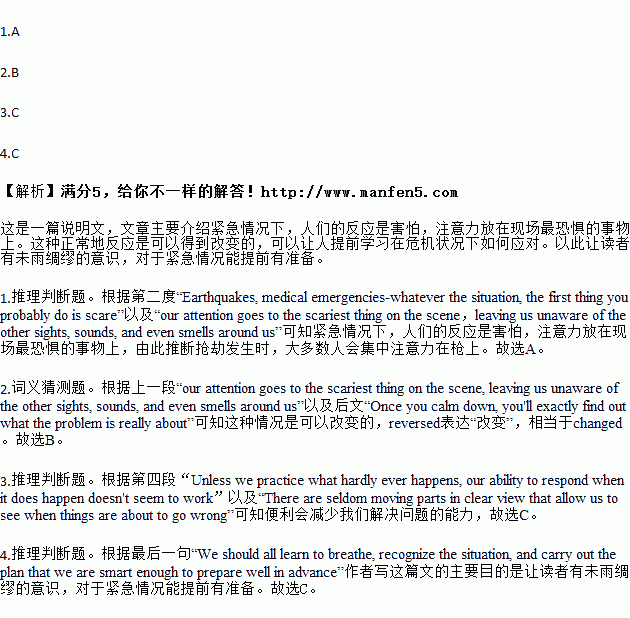题目内容
On January 15, 2009, the crew of US Airways Flight 1549 experienced a never-in-a-lifetime event. Less than two minutes after takeoff, some birds found their way into the airplane's two engines and brought them to a sudden stop. Over the next three and a half minutes, the crew managed to identify the problem, decide what to do about it, and make the most successful emergency (突发事件) landing in aviation (航空) history.
We all experience similar moments. Earthquakes, medical emergencies—whatever the situation, the first thing you probably do is scare. Everybody does. While many of us think that we're cool in a crisis (危机), science tells us that we seldom are. At the moment we need to be aware (有……意识的) of our surroundings, but our attention goes to the scariest thing on the scene, leaving us unaware of the other sights, sounds, and even smells around us. At the moment, we're anything but at our best.
These normal human reactions can be reversed. For example, firefighters are taught how to bring down their blood pressure and heart rates quickly. Box breathing, belly breathing—you can learn these techniques in minutes. Once you calm down, you'll exactly find out what the problem is really about. Lack of practice always causes us to judge problems in wrong ways. Doing the thinking ahead of time also helps you fire off the solution when it's show time. This is why you are advised to find the closest exit before the flight.
Performing in a crisis is becoming more important for all of us for two reasons. Back in the good old days, the dependability of most anything we used or did was far less than it is today. Now think about what happens to our preparedness as the probability of something bad happening reduces. Unless we practice what hardly ever happens, our ability to respond when it does happen doesn't seem to work. Also, as our life becomes better, the systems we use today are more complex (复杂的). There are seldom moving parts in clear view that allow us to see when things are about to go wrong. So terrible situations can "come out of nowhere".
As technology becomes part of most everything, and as once-large risks break into countless small ones, crisis situations may become standard events. We should all learn to breathe, recognize the situation, and carry out the plan that we are smart enough to prepare well in advance.
1.According to the passage, when an armed robbery (抢劫) happens, most people around will first ________.
A.focus on the gun B.pretend to be calm
C.decide what to do D.observe the surroundings
2.What does the underlined word "reversed" in Paragraph 3 probably mean?
A.tested B.changed C.predicted D.understood
3.It can be inferred from Paragraph 4 that ________.
A.things are less important than they used to be B.carefulness helps prevent the crisis happening
C.convenience reduces our problem-solving ability D.the complexity of present systems ensures our safety
4.What is the writer's main purpose in writing this passage?
A.To introduce ways of avoiding crisis situations. B.To point out the connection between stress and risks.
C.To raise awareness of the preparation for emergencies. D.To show the influence of technology on crisis management.

